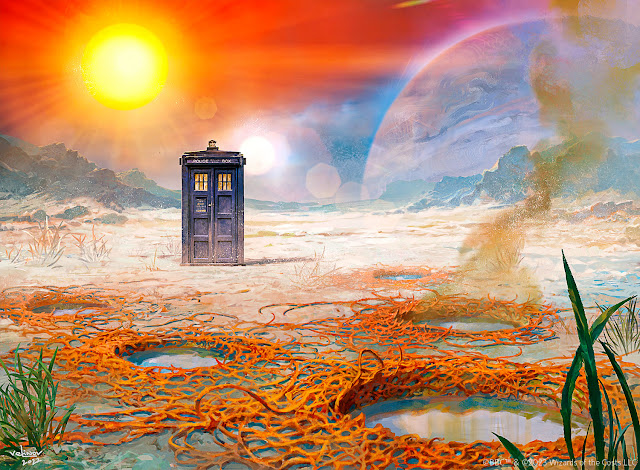The Janus Conjunction [PROSE/1998.10.5]
★★★☆☆
As if to drive home the almost-truth that almost all of the early Eighth Doctor Adventures writers had it in for Sam Jones, Trevor Baxendale quite literally drags her through the mud with intense pain, shock and slow-acting body horror and death. If you're checking this novel out, but don't think you've got the stomach to see this poor woman barely survive through the gloomiest circumstances, I wouldn't recommend reading the novel itself in the slightest. Now me, I wouldn't make a single character go through such a succession of taxing events (Longest Day, anyone? I think both as deveoloping Sam's characer through dropping her in the middle of a nightmare scenario and as Dr. Who adventures, I prefer that book to Baxendale's). I've grown to like her a lot over the course of this revisit of the series -- oh, Seeing I, where would we be without you? -- and it's pretty upsetting to see her in such pain. To see such a high-spirited young woman lose all hope and verge on the brink of death is more than a little disheartening.
The Janus Conjunction is a novel that tries very hard to be entertaining. Practically every chapter has a revelation or two, there are quite a number of chase sequences, and you can even spot a few moments where Baxendale so obviously chooses dramatic flair over logic (for instance, when the Doctor, Sam and Julya are standing right in front of the open TARDIS doors and held at gunpoint, why would they run away in any other direction than inside the TARDIS?). Then again, I rarely ever judge a work of art on its adherence to logic. Fact of the matter is, it's tailor-made to give the most thrills and engaging narrative development, so I'd be hard pressed to call the novel boring. Is it profound in anyway? No, alien planets, indigenous robot spiders and delirious half-dead villains are ten a penny in the world of Dr. Who, and Conjunction hardly presents anything innovative. With a sprinkle of body horror (the radiation on the planet causing slow melting of the skin), this book plays well within previously used tropes and, to its credit, uses those tropes well. It's what I'd call a stopgap installment, filler if I'm being particularly harsh, with a lot of work put into it to make it exciting. The Eighth Doctor is a cool, smooth agent of change, and he shines as he faces not only mad dictators from the outside but rigid authority from his side as well.
As if to drive home the almost-truth that almost all of the early Eighth Doctor Adventures writers had it in for Sam Jones, Trevor Baxendale quite literally drags her through the mud with intense pain, shock and slow-acting body horror and death. If you're checking this novel out, but don't think you've got the stomach to see this poor woman barely survive through the gloomiest circumstances, I wouldn't recommend reading the novel itself in the slightest. Now me, I wouldn't make a single character go through such a succession of taxing events (Longest Day, anyone? I think both as deveoloping Sam's characer through dropping her in the middle of a nightmare scenario and as Dr. Who adventures, I prefer that book to Baxendale's). I've grown to like her a lot over the course of this revisit of the series -- oh, Seeing I, where would we be without you? -- and it's pretty upsetting to see her in such pain. To see such a high-spirited young woman lose all hope and verge on the brink of death is more than a little disheartening.





Comments
Post a Comment